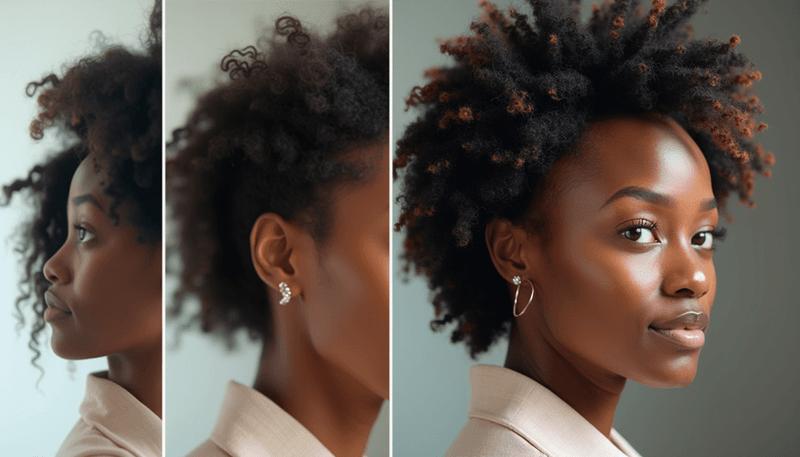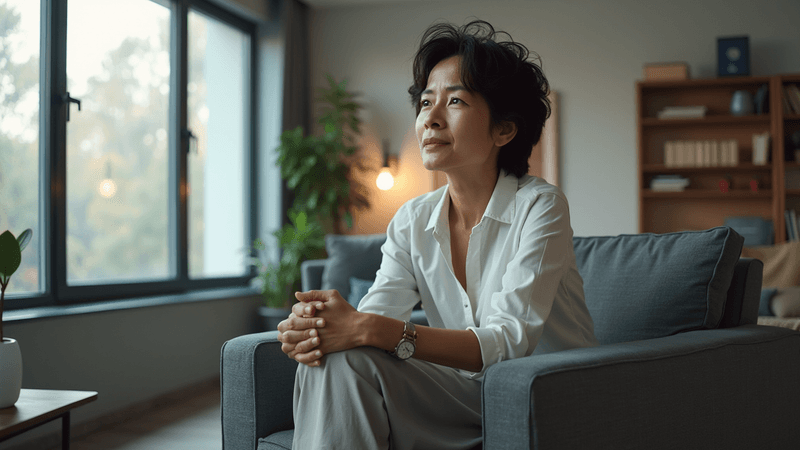Omega-3: Your Hair's Hidden Hero

That heart-sinking moment when you see clumps of hair in your shower drain – we've all been there. As someone who weathered the storm of postpartum hair loss, I know firsthand how emotionally challenging hair thinning can be. But here's some exciting news: recent research shows that omega-3 fatty acids might be the unsung hero in our fight against hair loss, particularly for women experiencing telogen effluvium – that frustrating type of hair loss that seems to happen suddenly and affects so many of us in our 30s and 40s.
The Science Behind Your Strands
Let's break down what's actually happening when we lose hair. Our hair goes through cycles – growing, resting, and shedding. Normally, about 80% of our hair is growing, while the rest is either taking a break or naturally falling out. When this cycle gets disrupted, we end up with what scientists call telogen effluvium, where more hair than usual enters the resting (telogen) phase before falling out.
Did you know? It's normal to lose 70-100 hairs per day, but when you're losing more than that consistently, your body might be trying to tell you something.
The fascinating part about omega-3s is how they work at the cellular level. Think of your hair follicles as tiny gardens. Just like gardens need the right nutrients in the soil, your follicles need proper nourishment to grow healthy hair. Omega-3 fatty acids act like premium fertilizer for these microscopic gardens.
The Omega-3 Revolution
The research tracked 120 women over six months, comparing those who took omega-3 supplements with those who didn't. The results were remarkable: 89.9% of women taking omega-3s reported reduced hair loss, while 86.1% noticed improved hair diameter. That's not just statistics – that's real hope for those of us struggling with thinning hair.
What makes omega-3s so special? They work in three key ways:
- They reduce inflammation around hair follicles
- They improve cell membrane health
- They enhance circulation to the scalp
Question to ponder: How many foods rich in omega-3s do you currently include in your weekly meals?
Practical Steps for Healthier Hair
Here's where we get really practical. Based on the research, I've developed a three-part strategy that any of us can implement:
-
Food First Approach
- Add fatty fish like salmon or mackerel twice a week
- Incorporate flaxseeds into your morning smoothie
- Snack on walnuts instead of processed foods
-
Supplement Smart
- Consider a high-quality omega-3 supplement (consult your healthcare provider first)
- Look for supplements containing both EPA and DHA
- Take with food to maximize absorption
-
Lifestyle Adjustments
- Reduce heat styling to minimize stress on hair
- Use a silk pillowcase to prevent friction
- Stay hydrated (aim for 8 glasses of water daily)
Beyond the Bottle
While omega-3 supplements showed promising results in the study, it's important to understand that hair health is multifaceted. The research revealed that women who took omega-3s saw improvements after six months – not overnight. This reminds us that patience and consistency are key.
Take a moment to reflect: What small, sustainable changes could you make to your daily routine to support your hair health?
Think of your hair care journey like tending a garden. You wouldn't expect a seed to become a flower overnight, and similarly, hair health requires time, proper nourishment, and the right environment to thrive.
The most empowering aspect of this research isn't just the positive results – it's the fact that we can take concrete actions to improve our hair health. Whether you're noticing more hair in your brush or simply want to maintain your current hair health, incorporating omega-3s into your routine could make a significant difference.
Ready to take the first step? Start by adding one omega-3-rich food to your diet this week. Monitor your hair shedding using a simple journal, and give yourself at least three months to notice changes. Remember, you're not just working on your hair – you're investing in your overall health and wellbeing.
In the spirit of community and support, I'd love to hear about your experiences with hair health and any changes you've noticed after incorporating omega-3s into your routine. After all, we're all in this together, supporting each other on our journey to healthier hair and greater confidence.

Amelia Grace Okonkwo
Amelia Grace Okonkwo is a freelance health writer and author with over 15 years of experience in health journalism, specializing in women's health and autoimmune disorders. With a background in biology and a Master’s in Public Health from Johns Hopkins, she combines scientific accuracy with a storytelling approach to make health information accessible and empowering. Amelia is known for her bestselling book, "The Skin We're In," which explores autoimmune disorders and their impact. She is passionate about delivering practical health insights for women, addressing topics from midlife wellness to mental health.





